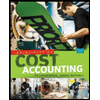Cholla Company’s standard fixed overhead rate is based on budgeted fixed manufacturing overhead of $10,800 and budgeted production of 36,000 units. Actual results for the month of October reveal that Cholla produced 31,000 units and spent $10,500 on fixed manufacturing overhead costs.
Variance Analysis
In layman's terms, variance analysis is an analysis of a difference between planned and actual behavior. Variance analysis is mainly used by the companies to maintain a control over a business. After analyzing differences, companies find the reasons for the variance so that the necessary steps should be taken to correct that variance.
Standard Costing
The standard cost system is the expected cost per unit product manufactured and it helps in estimating the deviations and controlling them as well as fixing the selling price of the product. For example, it helps to plan the cost for the coming year on the various expenses.
Cholla Company’s standard fixed overhead rate is based on budgeted fixed manufacturing overhead of $10,800 and budgeted production of 36,000 units. Actual results for the month of October reveal that Cholla produced 31,000 units and spent $10,500 on fixed
Trending now
This is a popular solution!
Step by step
Solved in 2 steps









